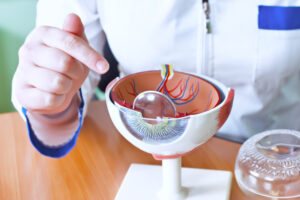
- Cataract surgery is a safe, effective procedure that millions of patients receive every year.
- The recovery process, while short, can be aided by following your doctor’s instructions and some general rules-of-thumb.
- The Cataract Surgeons help patients throughout Shreveport, Bossier City, Coushatta, and the surrounding Ark-La-Tex to improve their vision through routine exams as well as efficient, effective treatments.
To ensure that your cataract surgery recovery period goes as smoothly as possible, it is essential to follow the advice of your doctor. You may have unique circumstances that require specific recovery instructions. Generally, following these rules-of-thumb can help you prepare for a successful surgery and recovery period.
Preparing for a Successful Cataract Surgery Recovery
Cataract surgery requires sedation, so you will need someone to drive you to and from your appointment. Choosing a friend or family member to make sure you get home safely and confirming their availability with them the day before the surgery is essential.
Unless your doctor advises otherwise, you shouldn’t plan on eating anything after midnight the day of your surgery. You also should abstain from alcohol for at least the night before.
Typical Cataract Surgery Recovery Time
Immediately after you wake up from your surgery, you may have some blurry vision. This is normal and usually only lasts for a few hours. You may also experience redness in your eyes, but this should dissipate within a few days.
If you experience dry or scratchy eyes post-surgery, they should go away as your eye continues to heal. The only real exception to this is if you already experienced consistent dry eyes pre-surgery.
It’s important to note that everyone heals at a different pace. Some people have clear vision almost immediately after surgery. Some people need a week or two to reach that level of visual acuity. Almost everyone, though, should fully recover from surgery within a month.
Cleaning Your Eye Post-Surgery
Keeping your eye clean is an essential component of recovery. In many cases, your doctor will prescribe you eye drops that aid the healing process and help prevent infection. Make sure to follow your doctor’s instructions regarding the use of the eye drops, but most people should follow some basic instructions:
- Only use them on the eye that’s been operated on.
- Wash your hands thoroughly before using your eye drops.
- Continue using your eye drops until your doctor instructs you to stop.
- Your eye drops should not be shared with anyone else.
- When using the eye drops, do not let the bottle touch your eye.
The drops can cause a sticky feeling around your eye. So, you may need to further clean your eye up to twice a day for around two weeks. Luckily, this is a simple process:
- Boil water and let it cool.
- Thoroughly wash your hands.
- Dip a clean gauze into the cooled water.
- Gently wipe around your eye, starting from near the nose and sweeping to the outside corner.
While cleaning your eye, it’s important not to wipe inside your eye. You should also refrain from washing your eye out with water or pressing on it.
Dos and Don’ts After Cataract Surgery
During your recovery period, you should practice good behaviors that aid healing:
- Continue to maintain your hygiene by bathing and showering as normal (but wear your eye shield while doing so)
- Follow all of your doctor’s instructions, including when to use eye drops
- Protect your eye outside by wearing your eye shield, or a pair of sunglasses
- Rest for two to three days after your operation
- Take pain medication if needed
- Use your eye shield at night for at least a week or until your doctor says it’s okay to stop
- Watch television or use your computer as normal
Conversely, there are some behaviors you should avoid post-surgery:
- Driving for at least the first day
- Engaging in strenuous activity for a few weeks
- Exposing your eye to common irritants like dirt, dust, pollen, and wind for the first couple of weeks
- Flying without consulting your doctor first
- Immediately after surgery, bending over or putting pressure on your eye
- Letting soap or shampoo get into your eye
- Rubbing your eye
- Swimming or using a hot tub during at least the first week but possibly longer
- Wearing eye makeup for at least four weeks
By following these simple dos and don’ts, you give your eye the best chance of healing quickly and effectively. Of course, the timelines listed above are general. So, if your doctor offers conflicting advice, it’s better to align your behaviors with those instructions.
When You Should Reach Out to Your Doctor
While cataract surgery is typically safe and effective, there are rare situations when post-surgery complications develop. In these instances, it’s best to communicate them to your doctor immediately to prevent them from becoming worse:
- You haven’t had any reduction in redness or swelling
- You notice an unexpected discharge from your eye
- You see odd flashes of light
- You’re experiencing eye pain that’s increasing or not going away
- Your eyesight is getting worse
- Your field of vision has changed
Each of these cases should be brought to your doctor’s attention as soon as possible. It is essential not to hesitate to do so.
The Cataract Surgeons
The Cataract Surgeons serve as the premier eye institute in Louisiana. We help patients throughout Shreveport, Bossier City, Coushatta, and the surrounding Ark-La-Tex experience better vision through regular exams and effective, efficient treatments, such as cataracts surgery, LASIK, and SMILE. To see if we can improve your vision, request an appointment with us online.



